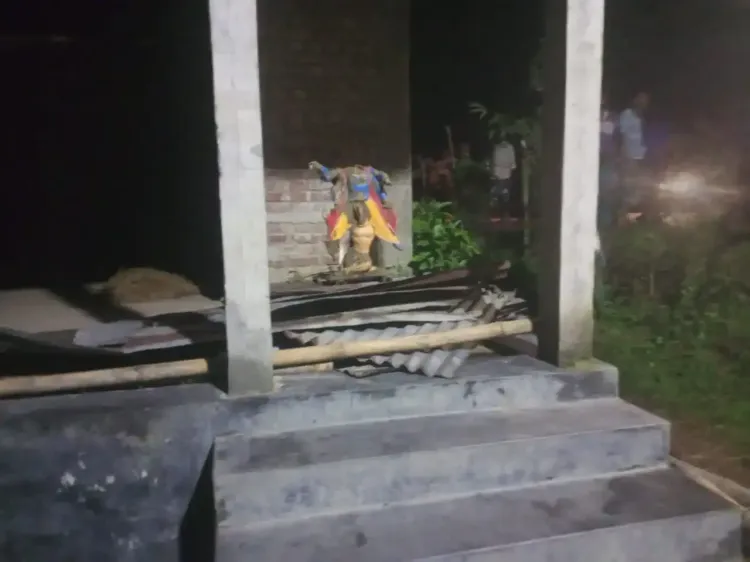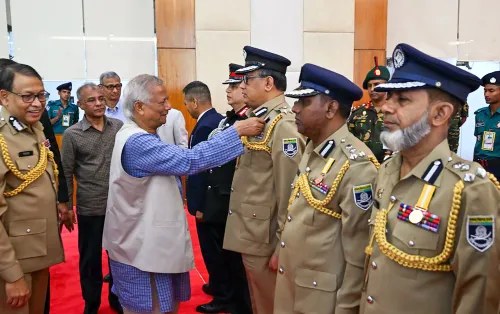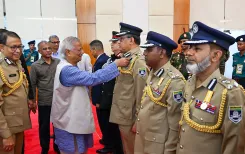What Happened with the Hindu Temples in Bangladesh?

Synopsis
Key Takeaways
- Vandalism of Hindu temples exposes deep-seated issues in Bangladesh.
- HRCBM's intervention highlights the need for protecting minority rights.
- Police negligence raises concerns about law enforcement accountability.
- Community courage plays a crucial role in addressing such incidents.
- International attention is necessary to uphold human rights.
Dhaka, June 23 (NationPress) The Human Rights Congress for Bangladesh Minorities (HRCBM) has condemned what they described as a shocking incident aimed at instilling fear in the Hindu minority community. This event involved the desecration of a Mahastri Manasa and Durga Temple located in the Dinajpur district.
“The attackers vandalized the temple, destroyed idols, and decapitated the idol of Goddess Manasa—an act of profound sacrilege intended to demean the minority community and provoke terror. As they made their escape, the assailants threatened local Hindus with further violence, promising harm at the next opportunity,” stated a press release from the HRCBM.
“The deep-seated fear experienced by Bangladesh’s Hindu population—exacerbated by years of violence, social exclusion, and institutional neglect—was starkly visible in this incident,” it added.
The HRCBM praised local residents for their courage in apprehending some of the suspects and promptly reporting the incident to Dhananjoy Kumar Mahanta, the Divisional Coordinator of HRCBM in Dinajpur.
However, the temple committee, facing intimidation from local Islamist groups and political pressures, chose not to file a formal complaint.
In response, HRCBM, committed to safeguarding minority rights, filed a case on behalf of the community to ensure that justice is served against the offenders.
“Despite HRCBM's filing of a formal complaint outlining a clear cognizable offense—specifically, the desecration of a worship site and threats against a minority group—the local police failed to fulfill their legal responsibilities by not registering the complaint and initiating proper criminal proceedings. This negligence signifies a serious violation of both national and international legal standards,” remarked the human rights organization.
“Moreover, the police’s endorsement of an Aposhnama (a compromise agreement) through the Union Parishad Chairman, Md. Humayun Kabir, despite the existence of a serious criminal offense, constitutes an abuse of power and potentially shields the criminals from prosecution, amounting to criminal misconduct,” they added.
Expressing concern, HRCBM highlighted that coercion became even more evident when they contacted Marufat Hossain, the Superintendent of Police in Dinajpur, to ensure the case was properly documented.
“Instead of providing assistance, the Superintendent allegedly behaved unprofessionally, using threatening language and attempting to intimidate HRCBM’s Convenor, Advocate Lucky Bacchar. Such behavior not only breaches professional ethics but also obstructs justice,” stated the human rights group.
The HRCBM emphasized that the desecration of the Dinajpur temple is not an isolated incident but rather part of a troubling trend in Bangladesh, where assaults on Hindu temples, minority residences, and properties have become more rampant.
“Encouraged by rising religious intolerance, extremist groups exploit the current climate of impunity to seize minority lands, demolish places of worship, and terrorize vulnerable communities into silence or compliance,” said HRCBM.
The organization urged both national and international human rights entities, including the United Nations and the International Criminal Court, to take notice of these ongoing crimes against minorities and to pressure Bangladesh to honor its commitments under international law.
HRCBM also called on the interim government of Bangladesh under Muhammad Yunus to promptly register the case, investigate the alleged police misconduct, and take measures to restore minority confidence in the rule of law.








